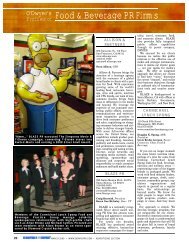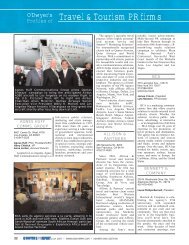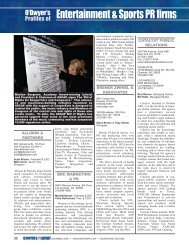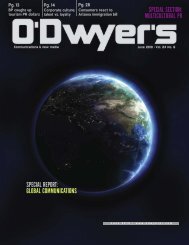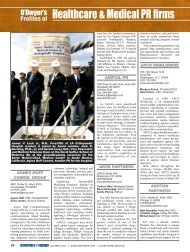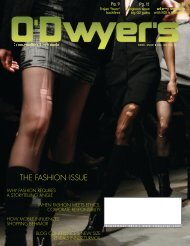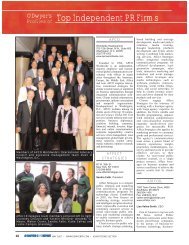Mar. '13 Food & Beverage PR Magazine (PDF) - Odwyerpr.com
Mar. '13 Food & Beverage PR Magazine (PDF) - Odwyerpr.com
Mar. '13 Food & Beverage PR Magazine (PDF) - Odwyerpr.com
You also want an ePaper? Increase the reach of your titles
YUMPU automatically turns print PDFs into web optimized ePapers that Google loves.
FEATURE<br />
New tech realities result in culture of disconnection<br />
The advent of new technologies has resulted in the unintended<br />
consequence of a culture of disconnection, where younger<br />
generations miss out on needed personal interactions that<br />
shape and refine good <strong>com</strong>munications skills. By Ron Sachs<br />
My daughter recently told me that<br />
one of her classes this semester<br />
at the University of Florida —<br />
“Interpersonal Communication” — is<br />
now conducted <strong>com</strong>pletely online, where<br />
students sit alone at home, or wherever,<br />
to watch pre-recorded video lectures<br />
from an instructor. Student interaction<br />
occurs only when they post <strong>com</strong>ments<br />
online.<br />
Frankly, this isn’t a major advancement<br />
in education or <strong>com</strong>munication. This is<br />
distant, not “distance” learning — and<br />
the class should be called “Impersonal<br />
Communications,” because that’s what<br />
it is.<br />
Trends like this run the risk of<br />
University of Florida (known as the<br />
“Gator Nation”) be<strong>com</strong>ing better<br />
known as “Gator Alien-ation.” But<br />
unfortunately it’s happening everywhere<br />
— and the critical issues raised<br />
go beyond just education to nearly<br />
every way that we spend our time at<br />
work, study, home and leisure.<br />
The rush toward connected detachment<br />
is not just a generational divide —<br />
because it’s sucking all of us in. Sure,<br />
incredible advances in technology have<br />
‘shrunk’ the planet and the mere push<br />
of a button transports us to other people,<br />
other places. Clearly, the benefits<br />
are bountiful and have led to giant leaps<br />
of advancement in many fields. Public<br />
relations professionals are among the<br />
best practitioners of this technology —<br />
but it’s time for all of us to acknowledge<br />
the downside, just as much as we<br />
have embraced the upside.<br />
We are the “best” <strong>com</strong>municators of<br />
modern time because of the speedy,<br />
diverse ways we do it: inane cell phone<br />
chats with anyone — just because we<br />
can; effortlessly texting dozens of messages<br />
when we’ve largely forgotten<br />
what our own handwriting looks like.<br />
We are so snug in our modern <strong>com</strong>munications<br />
cocoons, opting for<br />
exchanges that often provide empty,<br />
soulless solitude rather than enriching<br />
human interaction.<br />
Notre Dame football star Manti<br />
Te’o’s humiliating revelation that the<br />
“girlfriend” he had been “attached” to<br />
for the past three years was one that he<br />
actually never met, makes the point in a<br />
most bizarre way. That story is almost<br />
scary in its recognition that long-distance<br />
relationship triggered via technology<br />
abandon seeing, hearing, touching<br />
in any <strong>com</strong>bination of acceptability.<br />
Though Te’o may have been duped into<br />
this nearly unbelievable hoax about<br />
which all of the facts are still more<br />
murky than clear, the anecdote demonstrates<br />
that too many people are living<br />
their lives virtually. But that’s not living.<br />
Thesis: we’re in the beginning of the<br />
end of real human <strong>com</strong>munications.<br />
But, where’s the rebel force fighting to<br />
retain the last vestiges of human contact<br />
that could prevent us all from being<br />
voluntarily locked in our own narrow<br />
stalls of technology?<br />
Why visit our friends or family, when<br />
you can just text them, or Skype them?<br />
Why ‘write’ a real letter in our own<br />
hand anymore — when we can email,<br />
text it, or even <strong>com</strong>mand Siri to do it<br />
for us?<br />
The written word in our own hand is<br />
an endangered species of <strong>com</strong>munications,<br />
and so, too, are the one-on-one<br />
conversations that are the other main<br />
anchor of human connection.<br />
At a Thanksgiving dinner, I watched<br />
a friend’s teen text her way through the<br />
meal, rarely looking up to relate to the<br />
family and friends gathered from faraway<br />
places just to be together in her<br />
home. The disconnection powered by<br />
our tech connections makes all of us<br />
producers and publishers — but the<br />
quality of our interaction often sinks to<br />
an all-time low.<br />
I’m not denying or ridiculing the significant<br />
wonders achieved by our new<br />
technologies and their power to shrink<br />
the planet. For example, families separated<br />
by military service are thankfully<br />
connected by such special conversations<br />
that only technology provides.<br />
There are myriad other useful and positive<br />
applications that we are still<br />
exploring in work, education and<br />
leisure.<br />
But let’s also recognize that we are<br />
seduced by the addictive allure of<br />
devices that we don’t fully understand<br />
but still are determined to use, and we<br />
are connected from our first waking<br />
moments to our last conscious acts.<br />
The frantic daily sprint to constantly<br />
stay in touch has helped too many of<br />
our children, friends, neighbors, colleagues<br />
— and ourselves — to lose real<br />
touch with the most<br />
important principles<br />
of human connectedness.<br />
When was the last<br />
time any of us ‘disconnected’<br />
from the<br />
tech world for an<br />
extended period of<br />
time? While<br />
answers may vary, Ron Sachs<br />
the truth is many of<br />
us would feel a ‘separation anxiety’<br />
from the voluntary, brief abandonment<br />
of technology, but not so much from<br />
people.<br />
Multi-function technology has surely<br />
propelled our society to bold new<br />
heights of achievement. But it also has<br />
devolved us into multi-tasking fanatics<br />
who willingly choose too much to isolate<br />
in the process of ‘<strong>com</strong>municating.’<br />
The death of the real written and spoken<br />
word has not yet occurred — but<br />
we are close to laying them both to rest.<br />
Ironically, we believe we are <strong>com</strong>municating<br />
at the highest level in history —<br />
and, we are, in many respects. But we<br />
also, in fact, have reduced the art to a<br />
cold, technical exercise to often devoid<br />
of deeper thought, feeling and warmth.<br />
The answer to this global warning<br />
and threat is for each of us to examine<br />
how we <strong>com</strong>municate — and what we<br />
could do differently to be<strong>com</strong>e the masters<br />
of our technology, rather than its<br />
willing slaves.<br />
It all could begin with a simple letter,<br />
in your own hand, to your mother — or<br />
a face-to-face friend meeting that starts<br />
and ends with a hug.<br />
Ron Sachs is a former newspaper and<br />
television journalist, and was Director<br />
of Communications to former Florida<br />
Governor Lawton Chiles. Since 1996,<br />
he has owned Florida-based Ron Sachs<br />
Communications, with offices in<br />
Tallahassee and Orlando. £<br />
22<br />
MARCH 2013 4 WWW.ODWYER<strong>PR</strong>.COM



